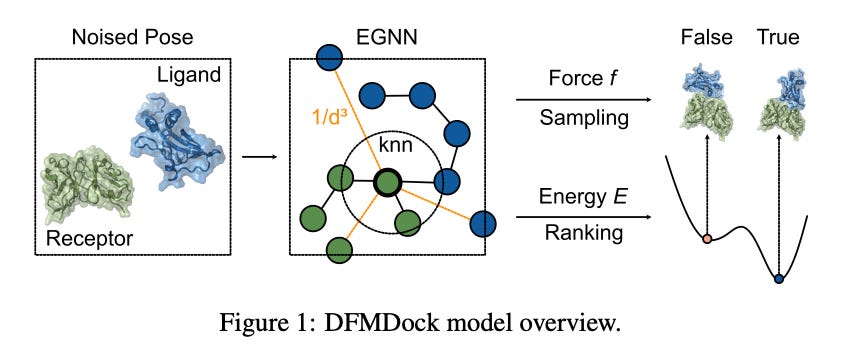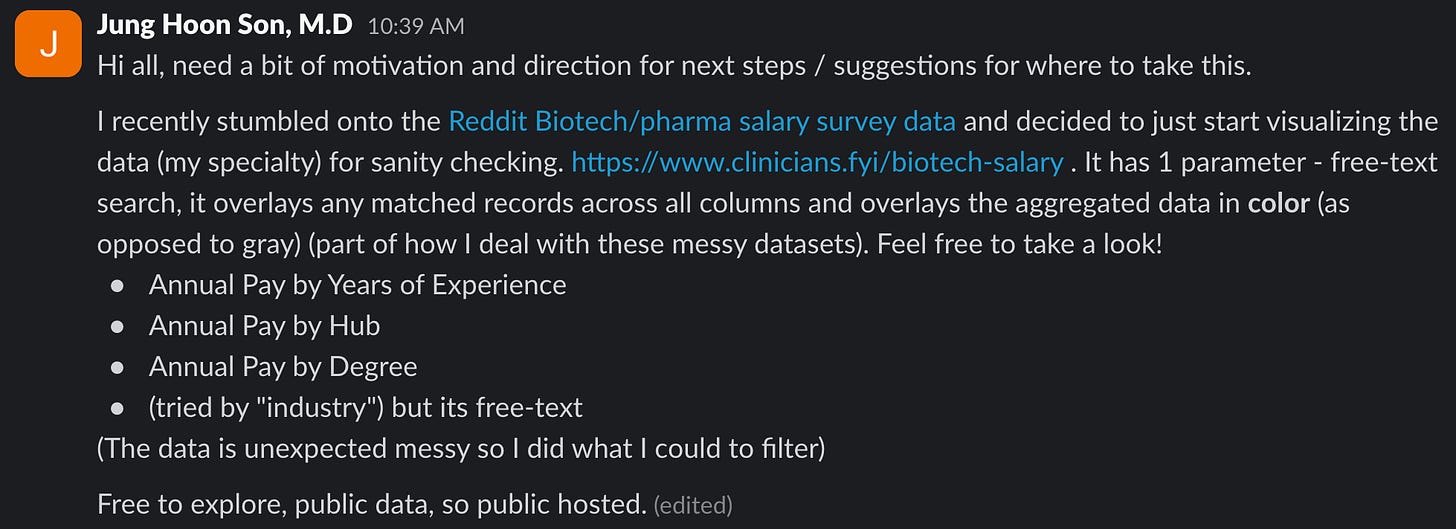📢 Highlights
DFMdock seeks to deliver fundamental advance in protein docking
The darling of Boston Biotech VC, ARCH, secures $3B for newest fund
California Governor, Gavin Newsome, sides with Tech to veto AI safety bill
Not yet a member of our super awesome slack community of >7500? Join HERE 🤗
👀 In Case You Missed it ..
Unified Sampling and Ranking for Protein Docking with DFMDock
Researchers at Johns Hopkins University have introduced DFMDock, a unified framework for protein docking that integrates sampling and ranking into a single, efficient process. Protein docking, crucial for understanding molecular interactions, traditionally relies on exhaustive global searches and separate evaluation steps, which are computationally intensive and time-consuming. While co-folding methods like AlphaFold2 and RosettaFoldAllAtoms offer high accuracy, they require extensive computations such as Multi-Sequence Alignment (MSA). Previous diffusion models like DiffDock and DiffDock-PP attempted to streamline docking but were hindered by the separation of sampling and ranking models, leading to inefficiencies and potential inaccuracies. DFMDock addresses these limitations by unifying these steps within one architecture, enhancing both efficiency and accuracy in predicting protein interactions. The research team has made their code available on GitHub.
ARCH Venture Partners Closes $3 Billion Fund to Invest in Biotech Innovation
Considered one of the leading biotech investors globally, ARCH Venture Partners has closed a $3 billion fund, ARCH Venture Fund XII, dedicated to investing in early-stage biotechnology and life sciences companies.This fund is one of the largest ever raised for life sciences venture capital, highlighting continued investor interest in biotech innovation and reflects a robust commitment to fueling innovation in areas such as genomics, synthetic biology, and novel therapeutics. Despite a cautious investment climate, ARCH's new fund signifies optimism about the potential for groundbreaking advancements in biotech, evidenced by their leading the billion dollar "seed round" for bio AI company, Xaira. The firm has a strong track record of backing companies that have made substantial contributions to the field, including investments in firms like Alnylam Pharmaceuticals and Denali Therapeutics.
Governor Newsom Vetoes California AI Safety Bill SB 1047
California Governor Gavin Newsom has vetoed Senate Bill 1047, legislation aimed at regulating generative artificial intelligence technologies. The bill would have required developers of large-scale AI models to submit detailed safety plans to the state attorney general and held them legally liable for harms caused by their AI systems. In his veto message, Governor Newsom expressed concerns that the bill could create a "false sense of security" and emphasized the need for a more comprehensive and nuanced approach to AI regulation. He highlighted ongoing efforts, including the establishment of an AI policy working group, to address the complexities and potential risks associated with AI technologies. Newsom's decision reflects the broader debate on how best to govern rapidly evolving AI systems without stifling innovation, with many seeing it as decision biased to benefit the large tech companies that have historically underwritten his election campaigns.
Arctoris Partners with Alphabet's Isomorphic Labs to Accelerate Drug Discovery
Embattled UK based robotic contract research organization, Arctoris, has announced a strategic partnership with Isomorphic Labs, an Alphabet company, to combine Arctoris's automated lab 'drug discovery platform' with Isomorphic's AI tools, creating a full AI development cycle - predict, make, measure, learn. This development follows closely on the heels of the departure of Martin-Immanuel Bittner, M.D., Ph.D., who served as CEO from January 2018 to February 2024. By leveraging automation in data generation and sophisticated AI for data analysis, the partnership seeks to enhance the efficiency of identifying new drug candidates, potentially reducing the time and cost associated with traditional drug discovery methods.
DCVC Bio Closes $400 Million Fund to Invest in Biotech Startups
DCVC Bio has successfully closed a $400 million fund dedicated to investing in early-stage biotech companies that leverage deep technology and computational approaches. Amid a challenging investment climate for biotech, this substantial fund aims to support startups working on innovative solutions in areas such as synthetic biology, computational drug discovery, and advanced therapeutics. DCVC Bio plans to back companies that integrate life sciences with cutting-edge technologies, addressing complex biological challenges through data-driven methods.
AstraZeneca to collaborate with Immunai on Immuno-Oncology Therapies
New York based Immunai's proprietary AI platform and single-cell genomics technology will be used by AstraZeneca to advance the development of immuno-oncology therapies. The partnership focuses on identifying novel targets and biomarkers to improve the efficacy of cancer immunotherapies. By combining Immunai's expertise in immune profiling and computational biology with AstraZeneca's clinical development capabilities, the collaboration aims to accelerate the discovery and development of new treatments that harness the body's immune system to combat cancer.
Regor Pharmaceuticals' CDK Inhibitors Acquired by Roche for $850 Million
Roche is acquiring exclusive rights to Regor Pharmaceuticals' portfolio of next-generation Cyclin-Dependent Kinase (CDK) inhibitors in a deal valued at $850 million upfront, with additional potential milestone payments. The acquisition strengthens Roche's oncology pipeline, particularly in treatments for hormone receptor-positive breast cancer. Regor's CDK inhibitors are designed to overcome resistance mechanisms associated with first-generation therapies like palbociclib. Under the agreement, Genentech, a member of the Roche Group, will lead clinical development and commercialization efforts, while Regor continues its ongoing clinical trials.
Vitessce, a New Tool to Enhance Visualization of Multimodal Single-Cell Data
A team at Harvard Medical School has released Vitessce, a visualization tool designed for multimodal and spatial single-cell data. This framework enables researchers to "simultaneously explore multiple data types in a unified interface," facilitating the integration of transcriptomics, proteomics, genome-mapped, and imaging modalities. Open-sourced under an MIT license, Vitessce is available as a Python package for Jupyter notebooks, an R package for RStudio, and even as a React component for web applications, with code posted on the lab's github.
Aktis Oncology Secures $175 Million to Advance Radiopharmaceutical Pipeline
One of the leading Bio AI companies in North Carolina, Aktis Oncology has raised $175 million in a financing round to propel its pipeline of radiopharmaceutical therapies targeting solid tumors. The funding will support the development of Aktis's proprietary platform, which delivers targeted radiation directly to cancer cells while sparing healthy tissue. The company plans to use the proceeds to advance multiple candidates into clinical trials, addressing cancers that are difficult to treat with conventional therapies.
BioAge Labs Raises Nearly $200 Million in Nasdaq IPO
The longevity focused biotech, BioAge Labs has successfully completed its IPO, raising close to $200 million. The company focuses on developing therapies that target the molecular mechanisms of aging to treat "age-related diseases" using a platform that integrates genomics, proteomics, and machine learning to identify pathways that can be modulated to extend healthy lifespan. The proceeds from the IPO will be used to advance the company's pipeline of drug candidates through clinical development, including treatments for conditions like muscle weakness and immune system decline in the elderly.
Genespire Secures $52 Million Series B Funding for Gene Therapy Programs
A biotechnology company specializing in gene therapies for inherited metabolic disorders, Genespire, has raised $52 million in a Series B. The funding will support the clinical development of the company's first pediatric in vivo gene therapy targeting metabolic diseases, as well as the expansion of its pipeline to address other genetic disorders. Genespire utilizes novel gene editing and delivery technologies based on lentiviral vectors and advanced genome engineering techniques developed in collaboration with the San Raffaele Telethon Institute for Gene Therapy (SR-Tiget) in Milan.
🗓️ Upcoming BiB Events
See our handy dandy Lu.ma event calendar HERE, please RSVP so folks can plan accordingly!
Copenhagen Bits in Bio Meetup – Tuesday, October 1st @ BioInnovation Institute
Our first meetup in Scandinavia!
Thank you to Alexander Junge and Ishani Unmat for organizing
Zurich Bits in Bio Meetup – Thursday, October 3rd
Thank you to George Mavrakis, Andrej Patoski, and Jonas Walheim for organizing!
Seattle Fall Biotech Happy Hour – Thursday, October 10th @ Tapster
Thanks to Nermeeta Dhillon, Jag Singh, and Brenda Phansukhumthana for organizing!
San Diego Mixer – Thursday, October 10th @ The Scripps Research Institute
Thank you Robbie Matthews and Nick Edwards for organizing!
📰 Top Community Conversations
@ Jung Hoon Son has built and gifted a biotech/pharma compensation comparison tool to the community!
🙋 🙏 Community Asks
Feedback: How is the Newsletter doing? We’re trying different formats/content. In case the hyperlink above didn’t get your attention, maybe a bright orange button will!
Volunteer: Want to get involved with Bits in Bio, meet new members across the community, and learn about the ecosystem? We are looking for volunteers to help us create great content and manage the community.
🏢 Job Openings
Notable postings below - over 100 more on our community job board!
Business Development Manager at Turbine AI
Co-Founder at Simplex Molecular
Founding Data Engineer at E9 Genomics
Founding Software Engineer at E9 Genomics
PhD Student at Utah State University
Postdoctoral Research Associate at Keele University
🙏 Thank you for being a BiB Weekly reader!
We want to deliver what matters most in Bio AI and would love your feedback on how we can do better. Please weigh in as anon here or DM me directly!
— Vince Alessi, BiB Editor in Chief







